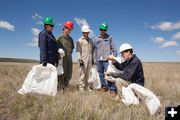

Youth Employment Program
Encana USA, QEP, Enterprise and EOG Resources recruited students to help pull noxious weeds in Sublette County. Pictured left to right: Tazia Morgart, Janna Stoutenburg, Sheldon Evans, Juan Carillo and supervisor Logan Guernsey. Photo courtesy Encana USA.
|
|
Industry leads youth in fight against noxious weeds
by Encana USA
November 15, 2011
There is an on-going battle in Jonah Field, between native and non-native species. Noxious and invasive weeds, such as cheat grass, thistle and Hoary cress have invaded the unshaded, open fields of Sublette County. The presence of these foreign plants is harmful and could impact the structure and function of native habitats.
To combat these weeds, Jonah Field energy operators recruited youth to join the newly formed Youth Employment Program. Initiated last February, the program goals are to eliminate foreign weeds and manage established weeds to prevent further expansion.
Encana Oil & Gas (USA) Inc. partnered with QEP Resources Inc., Enterprise and EOG Resources Inc. to establish and manage the Youth Employment Program. After a year of careful planning, the program commenced early this summer.
"This program is an early prevention measure that can impede the spread of weeds in newly-seeded locations, without the use of extensive chemicals later on," said Encana USA Reclamation Specialist Ralph Swift.
Eighteen students, ages 16-21, answered the operatorsí call and underwent the necessary training before they could take the battlefield and work. Students completed Encana USA field orientation, safety training, and are able to identify potential risks such as ticks, dehydration, trip hazards, sunburn, traffic and well site needs.
Armed with the proper knowledge, the troops started their mission in early June, enduring the summer heat to pull and destroy the noxious and invasive weeds, and pick up waste along the way. They were victorious. The student workers reclaimed an average of 3.5 acres on each of 600 locations in Jonah Field.
"We are quite pleased with the Youth Employment Programís first year, and the hard work the students put forth," Swift said. "The program gives the students a sense of pride and responsibility, encouraging them to protect and preserve the land from noxious weeds, and be responsible stewards."
The students targeted species of cheat grass, thistle and Hoary cress. These plants grow aggressively and multiply quickly without much control, negatively affecting the native habitats. Noxious weeds need to be pulled, as spraying could impact other vegetation.
Tazia Morgart, a student at Northwest College in Powell and graduate of Big Piney High School, gained valuable experience while participating in the Youth Employment Program. "The training helped me a lot and was very effective. I learned a lot about safety, equipment used on site, and Iím now more aware of my surroundings and can identify cheat grass."
Cheat grass is an annual grass that disturbs locations and has little nutritional value. Although itís not considered noxious, itís also not native. It emerged through seed grass and needs pulled to avoid fires.
"Itís important to identify cheat grass early in order to effectively control and prevent it form taking over resident plants," said Swift.
Janna Stoutenburg, also a former Big Piney Puncher, is a sophomore at Brigham Young University and was one of the programís student leaders. Certified in CPR and First Aid, Stoutenburg kept the high school students focused on the job.
"Iíve never worked with high school students before, but they impressed me. They were very willing to complete the task at hand and adapted to the work quickly in order to keep the land natural," Stoutenburg stated. "Overall, I believe this is a good and valuable program that achieves a job that needs to be done. Our duties were straightforward and we all understood what was expected of us, know the responsibility of the our jobs."
Around ten of the younger high school students hailed from Pinedale, Big Piney and La Barge. With the weeds pulled and the youth geared up to go back to school, the program concluded in mid August.
"The program taps an unemployed workforce, providing a great opportunity to give young kids valuable work experience and a look into the energy industry further than production," said Swift. "Encana USA constantly seeks to provide continuous education of our industry, and this is another way to promote weed control on reclaimed sites. We hope these students are able to return next summer."
Swift has been in the reclamation industry for nearly five years with Encana USA, after 31 years of service with the Natural Resources Conservation Service. He looks forward to retiring next spring and will be passing the reclamation reigns to Josh Sorenson.
Sorenson previously worked for the U.S. Forest Service for several years, and has a background in restoring land and range ecology.
"With the Forest Service, our practices were more broad, such as stabilizing landscapes after wildfires," said Sorenson. "But with Encana, we concentrate more on site-specific stabilization, such as on a well site. We are constantly looking at various ways to improve our performance to quickly and effectively restore the land the best we can."
Sorensonís duties include reclaiming disturbed areas, performing work assessment, reporting disturbance and reclamation to the JIO (Jonah Interagency Office), executing remediation work, and assisting on environmental issues for Encana USA.
"I started this new venture in September, and the training and education has been pretty intense," said Sorenson. "But everyone has been great to work with, and Encana has been very supportive. Itís what I expect, and where Iíd like to be."
|
